Please fill out the following information, and RRFC Admissions will contact you to discuss our program offerings:
Issue #53
by L. Swift and Jeff McQ


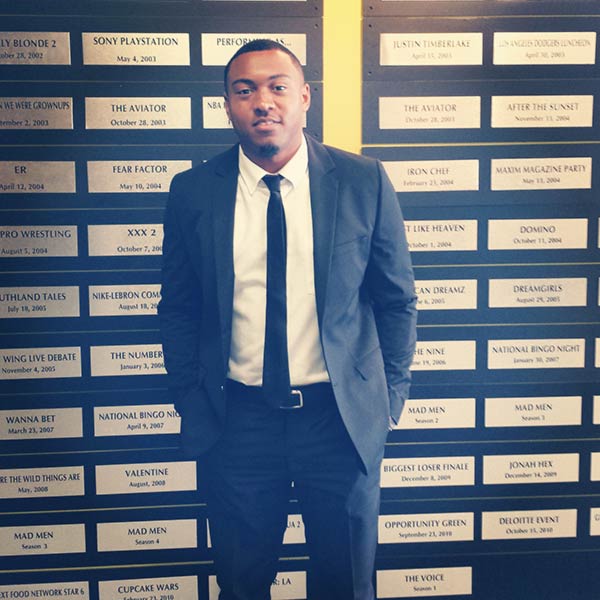 Once Victor Cobb decided he was going to pursue an education in film, he took the decision seriously and brought his a-game to the endeavor each and every day. So far, such a plan is taking him far.
Victor was researching other film schools online and, like so many aspiring filmmakers, he was daunted by the hefty tuitions being charged at Full Sail and other more traditional film schools. Then he found an option that seemed to make sense—Film Connection. Victor says he “looked at all the comments that were left about the program…did a little research on it,” and then “decided to do it.”
After making that critical decision to enroll in the Film Connection film program, Victor started interviewing with a number of different mentors in the Atlanta area. Victor went to not one, not two, but three different mentors before finding the film professional he most wanted to work with.
Both mentor and apprentice have to agree to enter into the mentorship-apprenticeship arrangement and finding a good fit is usually more of an art than a science. During the interviewing process it is important to balance one’s excitement to just get started with one’s objectives. Victor knew that even though he was interested primarily in directing and screenwriting, he also wanted to “learn a little bit about each aspect of the business from the bottom up… what each position does, how it all fits, how it all works together.”
Ultimately that led Victor to study with Steve Carmichael, formerly of Radiant 3 and now at Rite Media Group in Atlanta, Georgia. What led him to choose Steve, Victor says, was mostly “his energy and his knowledge about the industry. When I sat down, he immediately just kind of opened up about himself and what he used to do. One topic led to another topic, which led to another topic, and he was just very easy to talk to. He just had a lot of knowledge that he could just lay on you and within seconds of just talking to you.”
So that Victor would have the opportunity to learn as much as he could about the filmmaking process, Steve used his connections to get Victor onto a number of various projects including music videos, short films and television series. The experiences he had, including a stint as a gaffer, were enlightening for Victor who says, “just a little work like that, just gave me insight.”
Once Victor Cobb decided he was going to pursue an education in film, he took the decision seriously and brought his a-game to the endeavor each and every day. So far, such a plan is taking him far.
Victor was researching other film schools online and, like so many aspiring filmmakers, he was daunted by the hefty tuitions being charged at Full Sail and other more traditional film schools. Then he found an option that seemed to make sense—Film Connection. Victor says he “looked at all the comments that were left about the program…did a little research on it,” and then “decided to do it.”
After making that critical decision to enroll in the Film Connection film program, Victor started interviewing with a number of different mentors in the Atlanta area. Victor went to not one, not two, but three different mentors before finding the film professional he most wanted to work with.
Both mentor and apprentice have to agree to enter into the mentorship-apprenticeship arrangement and finding a good fit is usually more of an art than a science. During the interviewing process it is important to balance one’s excitement to just get started with one’s objectives. Victor knew that even though he was interested primarily in directing and screenwriting, he also wanted to “learn a little bit about each aspect of the business from the bottom up… what each position does, how it all fits, how it all works together.”
Ultimately that led Victor to study with Steve Carmichael, formerly of Radiant 3 and now at Rite Media Group in Atlanta, Georgia. What led him to choose Steve, Victor says, was mostly “his energy and his knowledge about the industry. When I sat down, he immediately just kind of opened up about himself and what he used to do. One topic led to another topic, which led to another topic, and he was just very easy to talk to. He just had a lot of knowledge that he could just lay on you and within seconds of just talking to you.”
So that Victor would have the opportunity to learn as much as he could about the filmmaking process, Steve used his connections to get Victor onto a number of various projects including music videos, short films and television series. The experiences he had, including a stint as a gaffer, were enlightening for Victor who says, “just a little work like that, just gave me insight.”
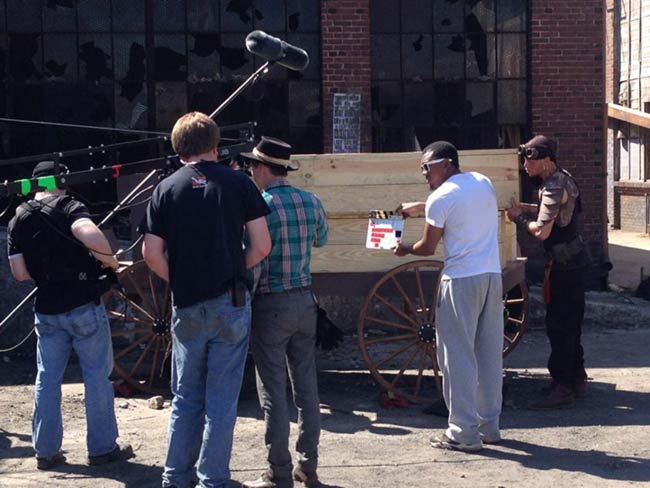 While Victor was getting plenty of hands-on experience with Steve Carmichael, he was also working on developing his screenplay with screenwriting mentor, Richard Brandes, who’s written and produced more than a dozen projects. Although screenplay meetings took place over the phone (Richard lives in the Los Angeles area), Victor found the arrangement “not too hard at all” and says the professional screenwriter and producer “made himself available more than I thought he would be.”
So what did Victor do now that he was getting the skills and connections and even had a screenplay under his belt? He did the 48 Hour Film Project! For the 48, filmmakers are given assigned genre and given a prop and a line of dialogue which they must incorporate into the film. Within exactly 48 hours, entrants must complete a 3-7 minute film including all rehearsals, shooting and post-production. In order to make the film a reality, Victor got to work months in advance, scouting for local talent and he even started a Kickstarter campaign to raise the capital they’d need to do the project.
Success on the 48 came in the form of a savvy, connected co-director Tommie Ingram which then led to Sharon Tomlinson (at Studio 11) who helped Victor get the equipment, cast and even actor Carl Anthony Payne signed onto the film!
So what advice does Victor have for students who want to get the most out of program? First, don’t expect to have it all handed over to you. Victor says, “This program is not a hold-your-hand type of program. It’s kind of like the real life, kind of like the real industry, when you have to go out and get the knowledge that you want, that you need.” And ask questions. “A mentor is like a book that’s full of knowledge. You can’t gain any knowledge if you don’t read, if you don’t ask any questions.”
We look forward to hearing more about Victor’s successes in filmmaking. Keep bringing your a-game Victor and you’ll go far!
While Victor was getting plenty of hands-on experience with Steve Carmichael, he was also working on developing his screenplay with screenwriting mentor, Richard Brandes, who’s written and produced more than a dozen projects. Although screenplay meetings took place over the phone (Richard lives in the Los Angeles area), Victor found the arrangement “not too hard at all” and says the professional screenwriter and producer “made himself available more than I thought he would be.”
So what did Victor do now that he was getting the skills and connections and even had a screenplay under his belt? He did the 48 Hour Film Project! For the 48, filmmakers are given assigned genre and given a prop and a line of dialogue which they must incorporate into the film. Within exactly 48 hours, entrants must complete a 3-7 minute film including all rehearsals, shooting and post-production. In order to make the film a reality, Victor got to work months in advance, scouting for local talent and he even started a Kickstarter campaign to raise the capital they’d need to do the project.
Success on the 48 came in the form of a savvy, connected co-director Tommie Ingram which then led to Sharon Tomlinson (at Studio 11) who helped Victor get the equipment, cast and even actor Carl Anthony Payne signed onto the film!
So what advice does Victor have for students who want to get the most out of program? First, don’t expect to have it all handed over to you. Victor says, “This program is not a hold-your-hand type of program. It’s kind of like the real life, kind of like the real industry, when you have to go out and get the knowledge that you want, that you need.” And ask questions. “A mentor is like a book that’s full of knowledge. You can’t gain any knowledge if you don’t read, if you don’t ask any questions.”
We look forward to hearing more about Victor’s successes in filmmaking. Keep bringing your a-game Victor and you’ll go far!
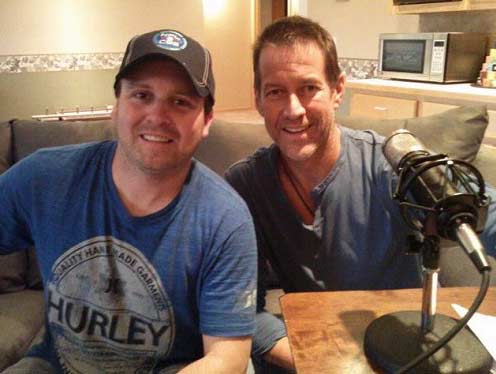
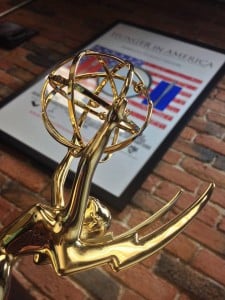 SPECIAL ANNOUNCEMENT!
Congrats to Film Connection mentor Zac Adams Midsouth Emmy Winner for Hunger in America!!!
Film Connection mentor Zac Adams, producer, director and CEO for Skydive Films in Nashville, TN, recently took home a Mid-South Emmy Award for his televised documentary film Hunger In America, narrated by James Denton!
“Winning a Mid-South was truly an honor, especially for a film we spent over 2 years and travelling 10,000 miles making,” says Zac. “I hope this achievement will spread the message of the hunger crisis happening here in our own back yard.”
Zac is currently putting the finishing touches on a new documentary, Autism In America, set for release March 18. Film Connection apprentices Jamie Reed and Matthew Gibson are both working on the film. Congratulations on the win, Zac!
SPECIAL ANNOUNCEMENT!
Congrats to Film Connection mentor Zac Adams Midsouth Emmy Winner for Hunger in America!!!
Film Connection mentor Zac Adams, producer, director and CEO for Skydive Films in Nashville, TN, recently took home a Mid-South Emmy Award for his televised documentary film Hunger In America, narrated by James Denton!
“Winning a Mid-South was truly an honor, especially for a film we spent over 2 years and travelling 10,000 miles making,” says Zac. “I hope this achievement will spread the message of the hunger crisis happening here in our own back yard.”
Zac is currently putting the finishing touches on a new documentary, Autism In America, set for release March 18. Film Connection apprentices Jamie Reed and Matthew Gibson are both working on the film. Congratulations on the win, Zac!
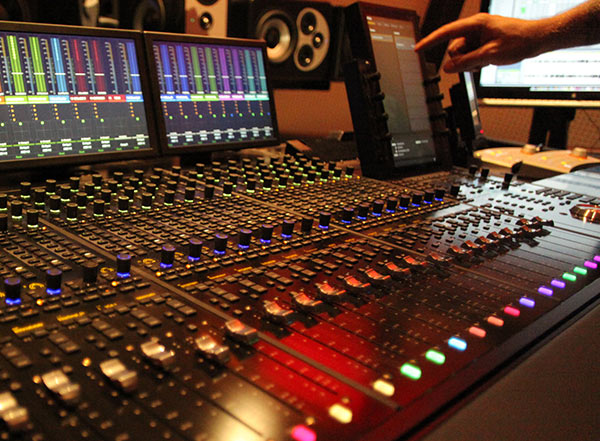 On Friday February 6th, our own Brian and Jimi went BACKSTAGE at GRAMMYS for a behind the scenes technical tour courtesy of our friends at the Recording Academy’s Producers and Engineers Wing.
Brian and Jimi were able to invite a Recording Connection Master’s student, TAYLOR CROMMIE to join them! Taylor met many of the legends and hardworking pros who make the GRAMMYS happen each and every year. The GRAMMY Awards is clearly the most complicated broadcast production event of the year. For the home audience, CBS once again delivered the most advanced form of HDTV, with 1,080 lines of picture resolution and 5.1-channel surround sound.
On Friday February 6th, our own Brian and Jimi went BACKSTAGE at GRAMMYS for a behind the scenes technical tour courtesy of our friends at the Recording Academy’s Producers and Engineers Wing.
Brian and Jimi were able to invite a Recording Connection Master’s student, TAYLOR CROMMIE to join them! Taylor met many of the legends and hardworking pros who make the GRAMMYS happen each and every year. The GRAMMY Awards is clearly the most complicated broadcast production event of the year. For the home audience, CBS once again delivered the most advanced form of HDTV, with 1,080 lines of picture resolution and 5.1-channel surround sound.
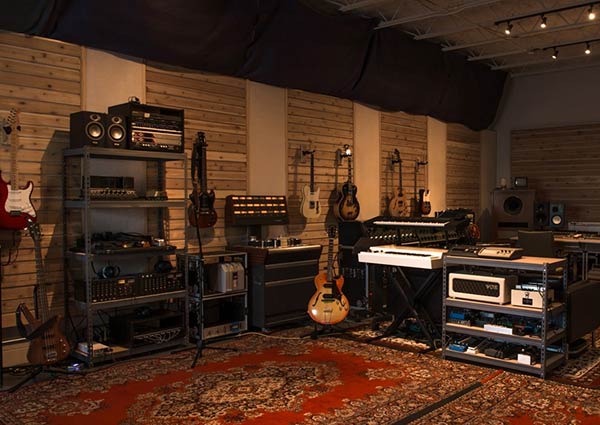 RRFC: did you have any mentors yourself when you were first starting out in the industry?
Nick Joswick: Yeah, well I guess probably the head engineer at 5th Street at the time… He and I really got to form a good friendship and definitely feel like just getting to pick his brain, seeing more of how the actual industry worked from the insider’s perspective, that he was definitely one of my guides coming up.
RRFC: You’ve mentioned before that you feel hands-on training is important for people wanting to learn studio work.
Nick: In big classes of 30 or 40-plus kids, I feel like that personal touch is lost, you know? I feel like it’s a good thing to do to be able to help kids one-on-one and really give them the most bang for their buck, really.
RRFC: What did Recording Connection student Michael Ilumin want to get out of the program when he first came to you?
Nick: He produces beats and does a lot of electronic music himself, so I feel like initially he was just wanting to kind of further his outlook in that sense, and further his ability for production and for creating his own music. And then, once we kind of started getting into it and getting into the program, he started seeing how vast audio engineering actually can be and what all goes into it, from the engineering side to the production side, to producing other people’s music and all of that. And he kind of started to really grasp onto everything. So I think he first started off looking to further his own thing, but he also had come into it with a very open mind, not really knowing exactly what to expect…but just knowing that he wanted to learn as much as he could.
RRFC: did you have any mentors yourself when you were first starting out in the industry?
Nick Joswick: Yeah, well I guess probably the head engineer at 5th Street at the time… He and I really got to form a good friendship and definitely feel like just getting to pick his brain, seeing more of how the actual industry worked from the insider’s perspective, that he was definitely one of my guides coming up.
RRFC: You’ve mentioned before that you feel hands-on training is important for people wanting to learn studio work.
Nick: In big classes of 30 or 40-plus kids, I feel like that personal touch is lost, you know? I feel like it’s a good thing to do to be able to help kids one-on-one and really give them the most bang for their buck, really.
RRFC: What did Recording Connection student Michael Ilumin want to get out of the program when he first came to you?
Nick: He produces beats and does a lot of electronic music himself, so I feel like initially he was just wanting to kind of further his outlook in that sense, and further his ability for production and for creating his own music. And then, once we kind of started getting into it and getting into the program, he started seeing how vast audio engineering actually can be and what all goes into it, from the engineering side to the production side, to producing other people’s music and all of that. And he kind of started to really grasp onto everything. So I think he first started off looking to further his own thing, but he also had come into it with a very open mind, not really knowing exactly what to expect…but just knowing that he wanted to learn as much as he could.
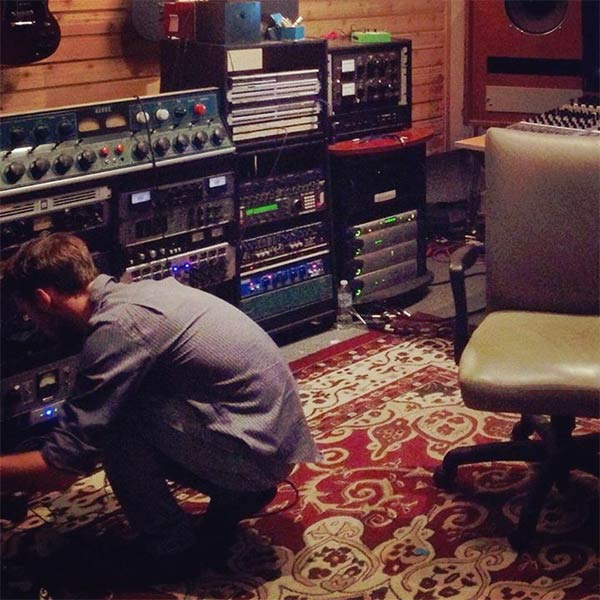 RRF: Isn’t it cool to watch someone’s mind expand as you mentor them?
Nick: It’s always a really good feeling when you can see somebody’s eyes light up when they finally make a connection of “Oh, okay, so this is why you have to go through a pre-amp first!” –[learning why] you have to plug a mic into a pre-amp, and then from there, you know, learning the signal close of that, and this is why it’s important.
RRFC: Why do you think Austin is so full of music? You can go to five shows a night, during any weeknight.
Nick: There’s almost some sort of undefinable quality that just kind of attracts people that are very still young at heart and young in general. This is a very young and happening city, but that just kind of perpetuates the need to have shows and the need to have something to do… Something’s always happening, there’s some sort of event that you can go to, to network with people, or just see music or see some kind of art happening. You know, I can’t literally put a finger on what exactly sets Austin apart like that.
RRFC: Do you think that Austin is like a place where artists can go to find themselves?
Nick: Absolutely, yeah. I mean, the culture and the mindset here is very open, and everybody is very willing to experiment and to participate in a lot of different things. And there are a lot of great artists in the scene now that are coming up.
RRFC: What are some of the artists you’ve gotten to work with whose work you’re excited about?
Nick: One of my favorites has definitely been White Denim, this rock-and-roll band, also from Austin. I’ve worked with them a bit as a whole band, but then I’ve also worked a lot with the singer for that band—his name is James Petralli. And he and I do a lot of stuff in the studio, and we’ve been doing a lot of kind of teaming up on things where I’m engineering and he’s producing sessions with some local bands in town. So White Denim and James Petralli have been some of my favorite artists to be working with so far, and also this band called Black Pistol Fire, it is kind of right on the cusp of doing some good things, as well.
RRFC: How often do you get your apprentices to work with the different bands that you’re tracking?
Nick: I try and get them in every time I have a full band, or even just single artists coming in to track vocals, or whatever it may be. My door is always open to my apprentices to come in and try to learn as much as possible. You know they have their lives, of course, and they have to make a living and all that, so it’s not always feasible for them to come in, but I highly encourage them to come in as much as possible, just because the more you’re in the studio, the more you’re around it and just immerse yourself it, the quicker it’s going to start sinking-in for you.
RRFC: So what is it about 5th Street Studios that sets it apart?
Nick: I think one of the main things would be our focus on analog equipment. We still have a 24-track tape machine and a 2-track half-inch tape machine that we mix down to, depending on the project. And then we have a lot of great analog outboard gear, and then our board, as well, which is a Neve Console from 1973…Then also, we have a fairly, not a big live room, but a fairly large live room with big, tall ceilings, and [it] can go anywhere from really tight sounds, really close and really present, to big, roomy, open sounds pretty easily. It’s just a nice relaxed atmosphere and good vibe.
RRFC: If you were giving advice to a potential apprentice about how they can get the most out of the Recording Connection program, what would it be?
Nick: I kind of mentioned this earlier, almost total immersion in the program, like as much time as you can spend reading about this stuff and digesting it, and having it in your head…the more you can just be around it and be in it all the time, the faster you’re going to catch on.
RRF: Isn’t it cool to watch someone’s mind expand as you mentor them?
Nick: It’s always a really good feeling when you can see somebody’s eyes light up when they finally make a connection of “Oh, okay, so this is why you have to go through a pre-amp first!” –[learning why] you have to plug a mic into a pre-amp, and then from there, you know, learning the signal close of that, and this is why it’s important.
RRFC: Why do you think Austin is so full of music? You can go to five shows a night, during any weeknight.
Nick: There’s almost some sort of undefinable quality that just kind of attracts people that are very still young at heart and young in general. This is a very young and happening city, but that just kind of perpetuates the need to have shows and the need to have something to do… Something’s always happening, there’s some sort of event that you can go to, to network with people, or just see music or see some kind of art happening. You know, I can’t literally put a finger on what exactly sets Austin apart like that.
RRFC: Do you think that Austin is like a place where artists can go to find themselves?
Nick: Absolutely, yeah. I mean, the culture and the mindset here is very open, and everybody is very willing to experiment and to participate in a lot of different things. And there are a lot of great artists in the scene now that are coming up.
RRFC: What are some of the artists you’ve gotten to work with whose work you’re excited about?
Nick: One of my favorites has definitely been White Denim, this rock-and-roll band, also from Austin. I’ve worked with them a bit as a whole band, but then I’ve also worked a lot with the singer for that band—his name is James Petralli. And he and I do a lot of stuff in the studio, and we’ve been doing a lot of kind of teaming up on things where I’m engineering and he’s producing sessions with some local bands in town. So White Denim and James Petralli have been some of my favorite artists to be working with so far, and also this band called Black Pistol Fire, it is kind of right on the cusp of doing some good things, as well.
RRFC: How often do you get your apprentices to work with the different bands that you’re tracking?
Nick: I try and get them in every time I have a full band, or even just single artists coming in to track vocals, or whatever it may be. My door is always open to my apprentices to come in and try to learn as much as possible. You know they have their lives, of course, and they have to make a living and all that, so it’s not always feasible for them to come in, but I highly encourage them to come in as much as possible, just because the more you’re in the studio, the more you’re around it and just immerse yourself it, the quicker it’s going to start sinking-in for you.
RRFC: So what is it about 5th Street Studios that sets it apart?
Nick: I think one of the main things would be our focus on analog equipment. We still have a 24-track tape machine and a 2-track half-inch tape machine that we mix down to, depending on the project. And then we have a lot of great analog outboard gear, and then our board, as well, which is a Neve Console from 1973…Then also, we have a fairly, not a big live room, but a fairly large live room with big, tall ceilings, and [it] can go anywhere from really tight sounds, really close and really present, to big, roomy, open sounds pretty easily. It’s just a nice relaxed atmosphere and good vibe.
RRFC: If you were giving advice to a potential apprentice about how they can get the most out of the Recording Connection program, what would it be?
Nick: I kind of mentioned this earlier, almost total immersion in the program, like as much time as you can spend reading about this stuff and digesting it, and having it in your head…the more you can just be around it and be in it all the time, the faster you’re going to catch on.



RRFC is education upgraded for the 21st century.
Get the latest career advice, insider production tips, and more!
Please fill out the following information, and RRFC Admissions will contact you to discuss our program offerings:
Stay in the Loop: Subscribe for RRFC news & updates!
© 2025 Recording Radio Film Connection & CASA Schools. All Rights Reserved.
